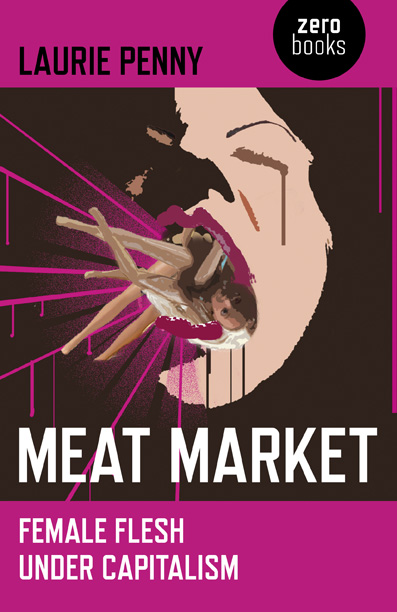Meat Market
A feminist dissection of women's bodies as the fleshy fulcrum of capitalist cannibalism, whereby women are both consumers and consumed.

A feminist dissection of women's bodies as the fleshy fulcrum of capitalist cannibalism, whereby women are both consumers and consumed.
A feminist dissection of women's bodies as the fleshy fulcrum of capitalist cannibalism, whereby women are both consumers and consumed.
Feminism & feminist theory, Social
Modern culture is obsessed with controlling women's bodies. Our societies are saturated with images of unreal, idealised female beauty whilst real female bodies and the women who inhabit them are alienated from their own personal and political potential. Under modern capitalism, women are both consumers and consumed: Meat Market offers strategies for resisting this gory cycle of consumption, exposing how the trade in female flesh extends into every part of women's political selfhood. Touching on sexuality, prostitution, hunger, consumption, eating disorders, housework, transsexualism and the global trade in the signs and signifiers of femininity, Meat Market is a thin, bloody sliver of feminist dialectic, dissecting women's bodies as the fleshy fulcrum of capitalist cannibalism.
GERMAN EDITION - voted number 5 by German journalists in their list of top ten non-fiction books of 2011.
Click on the circles below to see more reviews
A great first book on feminism. ~ Virginia Moffat, Peace News
At just 24, the talented journalist and student activist Laurie Penny is already a respected commentator.
Meat Market, her debut feminist polemic, offers a brutal materialist critique of popular culture to expose the tyranny of "the patriarchal capitalist machine" that perpetually denies the true value of female potential. Penny discusses women's sexualisation, eating disorders, gender stereotyping and the labour market, covering prostitution, housework, the marketisation of domesticity as a kitsch hobby, the prevalence of class delineation as a form of control and the positioning of the Playboy Bunny as an emblem of manufactured desirability.
She balances sophisticated theorising with the anecdotal, which prevents Meat Market from becoming a dense academic diatribe. The most evocative passages are rooted in the personal, including comments by diverse interviewees, and Penny's insightful exposition of the psychological nuances that precipitated her own battle with anorexia. "From time to time, I still miss my eating disorder," says Penny. "I miss the sense of control that comes when avoiding food is your highest ambition."
At times, her indictment of capitalist oppression – especially in relation to the policing of women's bodies and female sexuality – becomes a glib, less cogent reflection of arguments articulated by the established feminists to whom she is indebted. However, this does not mitigate the potency of her work, and she highlights the need for young feminists to reignite a debate that has been stifled by an acceptance of inequality as part of the status quo.
Her discussion of transsexualism, a divisive issue in feminist circles, forms the most perceptive chapter. She confidently dissects notions posited by Julie Bindel and Germaine Greer to argue that trans women are not proponents of gender stereotyping, but subject to restrictive definitions of "male" and "female" modes of behaviour, forced "to fight at every turn for the constrained right to consumer femininity." Though her statement that "not a single person on this planet is born a woman" is a hat-tip to Simone de Beauvoir, it stresses that pressures to emulate synthetic images of female beauty are universally detrimental, making trans activism rightly a "vital" part of the feminist movement.
Penny is an exceptional writer with a shark-bite wit, yet here her trademark hyperbole has been diluted. Though not completely lacking her excellent acidic branding, the rage that provokes impassioned responses to her journalism has been somehow trimmed and moulded into a more palatable form, which, though not hugely detrimental, is a shame.
On the whole, Meat Market is a nutritious thought-snack for emergent feminists and those approaching female cultural positioning from a socialist perspective. Penny's emphatic delivery centralises the urgent need for collaborative action that lets women know "with a clear and brilliant certainty, that our persons are powerful".
~ Abby O'Reilly, Independent on Sunday
Meat Market is a valuable contribution to understanding women’s inequality and a challenge to it. It is a welcome change to the claims that, because women are equal before the law, the fight for their emancipation is over, and it forces a consideration of how some of the ideas and understandings we take for granted are not as innocent as commonly thought. ~ The Oxonian Review
This book presents a compelling argument for the reassessment of feminist values, as well as the need to challenge the false consciousness of modern men and women. Personally charged invective that demands to be heard. I read over underlined passages repeatedly after finishing the book.
~ Emmet O'Cuana , a book a day till i can stayLaurie Penny hones her every phrase to a razor's edge. She is absolutely surgical in her anatomising of a mad world. MEAT MARKET is the kind of cut you learn from. ~ Warren Ellis , author of TRANSMETROPOLITAN, CROOKED LITTLE VEIN, RED